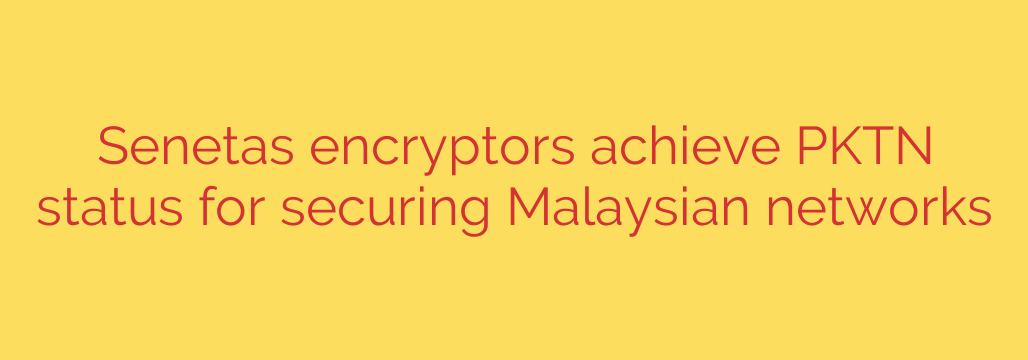
Strengthening Malaysia’s Digital Defenses: A New Standard in Network Security
In an era of escalating cyber threats, protecting sensitive data has become a paramount concern for governments and critical industries worldwide. For Malaysia, a significant milestone has been reached in fortifying the nation’s digital infrastructure. A new level of certified, high-assurance encryption technology is now officially approved for use across the country’s most sensitive government and critical networks.
This development marks a crucial step forward in safeguarding everything from classified government communications to the operational data of essential services, ensuring a robust defense against sophisticated cyberattacks.
Understanding the PKTN Certification: A National Seal of Approval
At the heart of this advancement is the PKTN (Produk Keselamatan Tandaan Kebangsaan) certification. This is not just another industry standard; it is a national security product marking issued by the National Cyber Security Agency (NACSA) of Malaysia.
Receiving PKTN status means a security product has undergone rigorous evaluation and has been deemed trustworthy for deployment in securing Malaysia’s most vital digital assets. It’s a definitive signal that the technology meets the highest standards required to protect government and Critical National Infrastructure (CNI). This includes sectors vital to the nation’s stability and economy, such as:
- Government and defense agencies
- Public utilities (energy and water)
- Financial services and banking
- Telecommunications networks
- Transportation systems
Why Hardware Encryption is a Game-Changer
The approved solutions are dedicated hardware encryptors, which provide a fundamentally more secure approach than software-based encryption alone. While software encryption is useful, hardware-based solutions offer a dedicated, tamper-resistant environment for cryptographic processes, operating independently from the systems they protect.
This separation ensures maximum performance and security. Key benefits include:
- High-Speed Performance: Capable of encrypting data at speeds up to 100 Gbps without impacting network performance, which is essential for modern, high-traffic networks.
- End-to-End Data-in-Motion Protection: Secures data as it travels across networks (Layer 2, 3, and 4), closing a common vulnerability exploited by attackers.
- Certified Assurance: These devices are often built to meet stringent international standards, such as Common Criteria EAL4+, providing verified proof of their security claims.
By implementing this level of security, organizations can be confident that their data remains confidential and unaltered as it traverses both trusted and untrusted networks.
Future-Proofing Security Against Tomorrow’s Threats
The digital threat landscape is constantly evolving, with the rise of quantum computing posing a long-term risk to current encryption standards. A powerful quantum computer could theoretically break many of the encryption algorithms used today.
To counter this, a forward-thinking approach is essential. The newly certified encryptors incorporate Quantum-Resistant Encryption (QRE). This technology uses next-generation algorithms designed to withstand attacks from both classical and quantum computers.
Implementing QRE today is crucial for protecting data with a long-term security requirement. It safeguards against “harvest now, decrypt later” attacks, where adversaries steal encrypted data today with the intention of breaking the encryption once quantum computers become available. Adopting quantum-resistant technology is a proactive step to ensure long-term data sovereignty and security.
Key Security Takeaways for Your Organization
While this certification directly impacts Malaysian government and CNI, the principles behind it offer valuable lessons for any organization serious about data protection.
- Prioritize Certified Solutions: When selecting security products, look for recognized, independent certifications like PKTN or Common Criteria. These provide third-party validation that a product does what it claims.
- Understand Your Data’s Journey: Data is most vulnerable when it’s in motion. Map out how your sensitive information travels across your network and ensure you have strong, end-to-end encryption to protect it.
- Layer Your Defenses: High-assurance encryption should be part of a comprehensive “defense-in-depth” security strategy. It is not a silver bullet but a critical layer that works alongside firewalls, access controls, and endpoint security.
- Plan for the Future: Don’t wait for quantum computing to become a mainstream threat. If you are protecting data that needs to remain secure for a decade or more, start evaluating and implementing quantum-resistant solutions now.
The official approval of this top-tier encryption technology represents a significant enhancement of Malaysia’s cybersecurity posture. By setting a high bar for network security, the nation is building a more resilient and secure digital future.
Source: https://datacenternews.asia/story/senetas-encryptors-gain-pktn-status-to-secure-malaysia-s-networks








